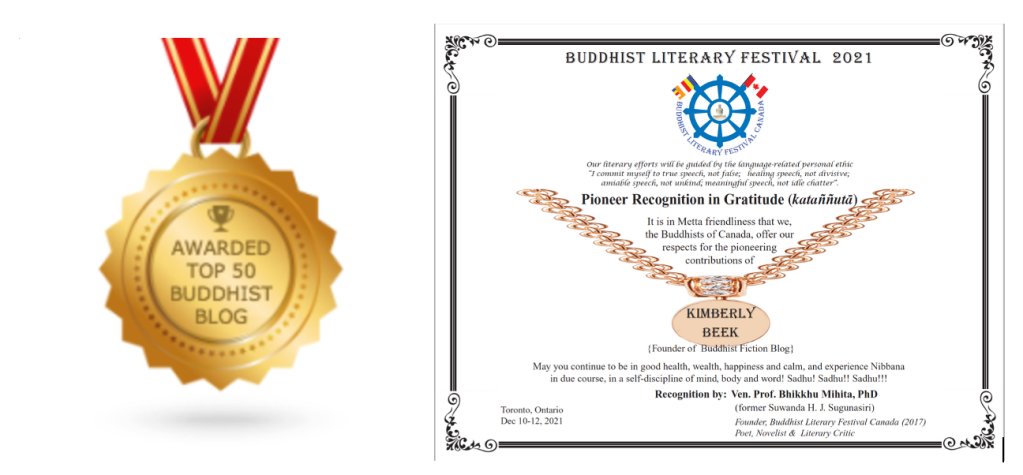 Doris Dörrie’s novel, Where Do We Go From Here?, published in English in 2002 by Bloomsbury U.S.A., first caught my attention because a chapter from this novel appears as a stand alone short story in Wisdom Publication’s first Buddhist fiction short story anthology, Nixon Under the Bodhi Tree and Other Works of Buddhist Fiction. In this anthology, the chapter does not provide a name for the narrator and main character, so I was extremely curious to find out more about the larger story. Since purchasing the whole novel and seeing the cover, I think I would have picked up the book based on the picture of a Buddha sitting atop a burger. Now every time I look at the book I think of the blog the worst horse, home of the dharma burger. But I digress.
Doris Dörrie’s novel, Where Do We Go From Here?, published in English in 2002 by Bloomsbury U.S.A., first caught my attention because a chapter from this novel appears as a stand alone short story in Wisdom Publication’s first Buddhist fiction short story anthology, Nixon Under the Bodhi Tree and Other Works of Buddhist Fiction. In this anthology, the chapter does not provide a name for the narrator and main character, so I was extremely curious to find out more about the larger story. Since purchasing the whole novel and seeing the cover, I think I would have picked up the book based on the picture of a Buddha sitting atop a burger. Now every time I look at the book I think of the blog the worst horse, home of the dharma burger. But I digress.
Bloomsbury U.S.A. gives the following overview of this novel: “Meet Fred Kaufmann, disillusioned husband of thoroughly competent Claudia and father of surly teenager Franka. His dreams of being a film director have long ago been shelved for marriage and a child. While Claudia sells her successful vegetarian take-away out to a fast-food chain and buys into Buddhism, her spouse is trapped in the throes of a classic midlife crisis, made worse when a young guru and Franka find each other irresistible. In this hilarious and touching social comedy Fred chaperones his daughter to the meditation centre in the South of France with the hope that brown rice and hardcore meditation will cure Franka’s obsession. But as a bizarre set of events unfolds Fred embarks on a journey of self discovery that only a special kind of hero can survive . . . ”
I have to give credit to Dörrie for writing an entire novel with such an unlikeable protagonist yet managing to keep me engaged. Usually I can find some form of empathy with a protagonist but I had difficulty in this area with Fred. I think I kept reading because I wanted to see what happened next in Fred’s adventure, and because I like the way that Dörrie rendered all of the other characters, who seemed to have sense enough to leave Fred to work his way through his own mid-life crisis.
One of my favorite parts of the book is a moment of clarity Fred experiences at the meditation retreat. After complaining about meditating, about the conditions of his surroundings, and about life in general, Fred finally starts to settle and has what Oprah would call an “aha” moment. During meditation he sees a blackbird hopping around outside of the meditation tent, and he suddenly hears the dawn chorus. . .
“I hear it as if I’d only just been equipped with ears. I don’t know anything about birds, so I can’t identify them, but I hear them not in the usual way, as an incidental twittering sound, but as a unique occurrence unrepeatable in this particular form. This dawn chorus will only occur once—now, this very moment—and if I don’t hear it now I’ll never hear it again. I’ll have missed it once and for all.
Euphoric as this realization makes me feel, I’m simultaneously shattered because it means I’m forever missing my own, unique life—because I’m blind and deaf” (p. 138).
After reading the description of this small mindful moment, I was hopeful that perhaps Fred’s metaphorical blindness and deafness would disappear and he would remember to keep his eyes and ears open, to try to be present in the moment not only for himself but for the people who still, miraculously, care for him. Then I finished reading the novel and was left wondering if Fred learned anything at all. I won’t spoil the ending for those who want to read the book, suffice to say that it is modern and open (no closure here by a long shot).
So did Fred learn anything from his moment of mindfulness? Clearly Dörrie’s novel is fiction, but can it be labeled “Buddhist” and if so, in what sense? Why? If there are other readers of this novel out there who would care to share their thoughts on this novel and more specifically these questions, I would really appreciate your comments!


